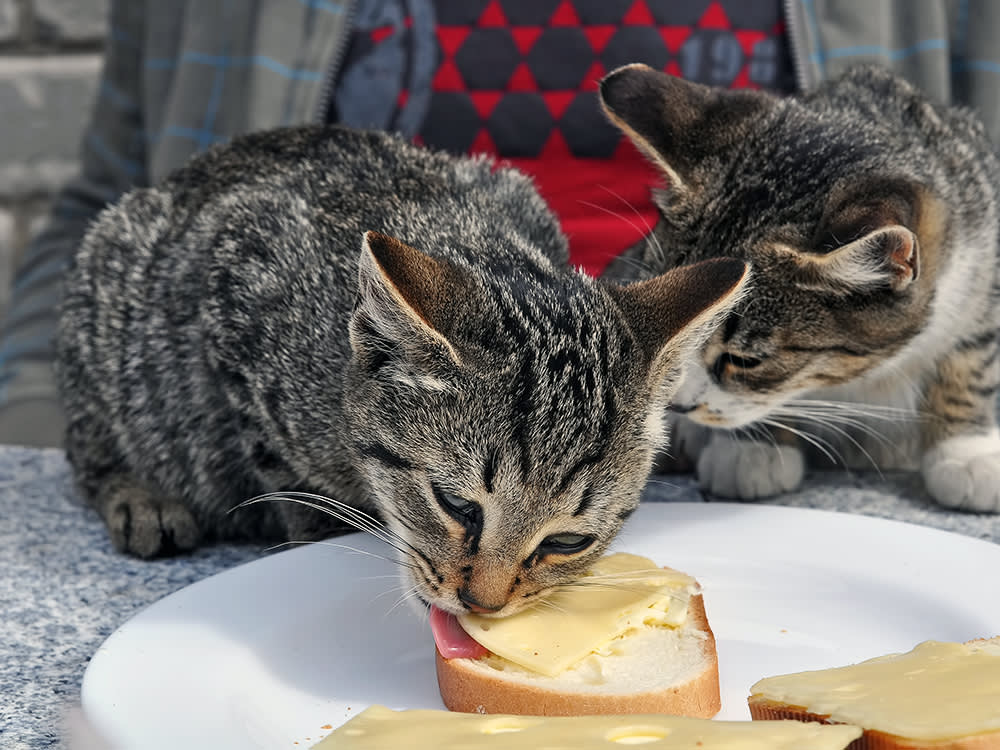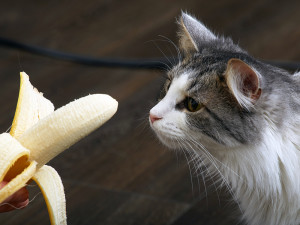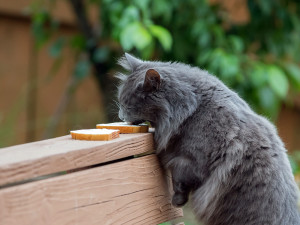You Should Not Invite Your Cat to Your Fancy Cheese Party
Save the charcuterie for the humans.

Share Article
Cheese is one of the best things about life. It pairs excellently with wine, it transforms a bowl of plain tortilla chips into delicious nachos, and it is something interesting to add to something less appealing (lookin’ at you broccoli). It even comes in non-dairy forms for those of us afflicted with an unfortunate dairy intolerance. But when your cat is literally sniffing around your charcuterie board, think twice before breaking out the brie.
While some cheeses — hello, cheddar — are safe for cats in moderation, others could cause health issues, including serious tummy troubles. Sharing an occasional bite of swiss from your sandwich or tucking a pill into a cube of cheddar is probably not a big deal, but you should never let your cat devour the leftovers after happy hour.
Why Shouldn’t Cats Eat Cheese?
“Some cats seem to tolerate more lactose in the diet than other cats,” says Dr. Maryanne Murphy, a clinical assistant professor of nutrition at the University of Tennessee. “It is okay to give most cats a small volume of dairy products like cheese, but sticking to a small amount is best because a higher quantity is more likely to risk negative gastrointestinal effects.”
Cats are obligate carnivores who need protein for optimal health. Cheese might be high in protein — an ounce of cheddar contains seven grams — but cheese (and other dairy products) were not meant to be the main source of protein in the feline food plan. Dr. Murphy notes that cats lack lactase, the enzyme needed to break down lactose in dairy products, making it hard for them to digest the delicious muenster or gouda. That’s why eating cheese can cause them to experience symptoms like gas, diarrhea, and vomiting.

Cheese (and other products containing lactose) could also interfere with your cat’s ability to digest protein. Plus, cheese is high in fat, which could cause your feline friend to pack on the pounds, increasing their risk of diabetes, pancreatitis, liver disease, and arthritis.
Are Certain Cheeses Safer Than Others?
Swiss and cheddar cheese are lower in lactose than other cheese, which makes them the safest options for cats. Skip the soft cheeses, such as mozzarella, cottage cheese, and cream cheese, which contain higher levels of lactose. There’s an extensive “no” list when it comes to cats and cheese.
Never offer brie and camembert or other cheeses made with raw milk because it increases the risk of pathogens including salmonella and listeria. Blue cheese contains mold, which can be toxic to cats. Non-dairy cheeses may not contain the lactose that causes tummy upset but vegan cheese are still high in fat and salt, which are not a part of a healthy diet for cats.
How to Add Cheese to Your Cat’s Diet
A few bites of cheese isn’t cause for alarm, but call your veterinarian if your cat devours a cheese pizza or noshes on any cheeses on the “no” list.

Jodi Helmer
Jodi Helmer is a North Carolina-based freelance writer who shares her home with an embarrassing number of rescue dogs and relies on four feral cats to patrol the barn. When she isn’t refilling food and water dishes, Jodi writes about animals for Scientific American, Sierra, WebMD, AKC Family Dog, Living the Country Life, and Out Here.
Related articles
![Dark grey cat eating two slices of break laid on top of a wooden railing of an outdoor deck]()
Can Cats Eat Bread?
Go ahead and give your carb-loving cat a few bites, but don’t hand over the bread basket.
Can Dogs Eat Pumpkin?
This superfood is delicious and full of nutrients—but how much is too much of a good thing?
![Ridgeback puppy eating an apple from a low-hanging tree]()
Can Dogs Eat Apples?
Here’s why this fiber-filled fruit is a healthy treat for your dog.
![overweight orange cat]()
How Much Should You Actually Be Feeding Your Cat?
If they’ve lost their hourglass figure, then not that much — according to a veterinary nutritionist.
![A grey cat looking at a dish of fish]()
The 5 Best Fish Oils for Cats
The next best thing to branzino, omega-3s support your cat’s skin, brain, joint, and heart health.







